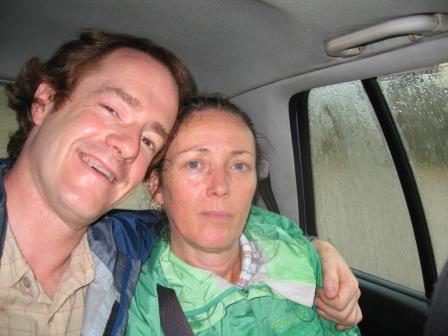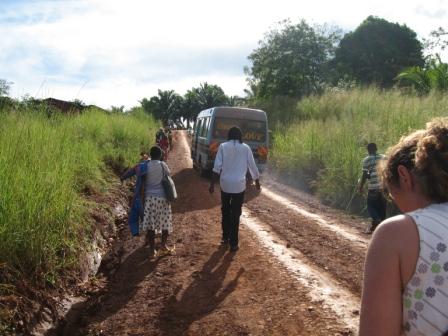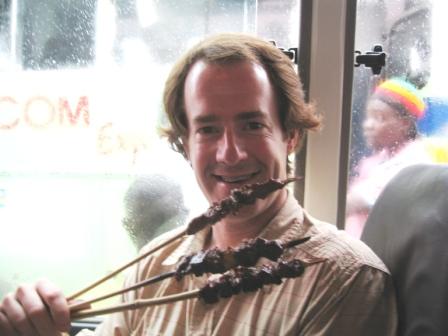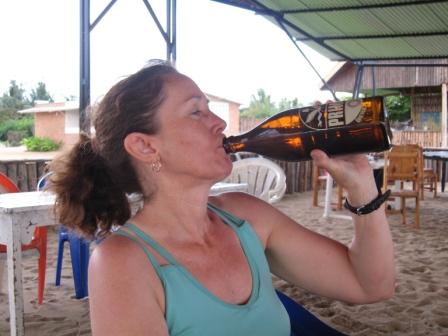Do you know the line from the Eagles’ song “Hotel California”, which says, “You can check out any time you like, but you can never leave”? Well, that’s what our last week has been like. Our objective is to get to Zambia, but we’re still working on it.
We decided to head south from Rwanda into the little traveled country of Burundi. Our bus trip took about eight hours, which once again had its usual set of adventures (we will tell you more about that later). We arrived at the bus stop at 7 AM for our 8 AM departure and we barely got seats together. We ended up sitting across the aisle from one another, with a fold down jump seat in between us, and our backpacks squished in between our legs and the seats ahead of us. The bus was completely full, with a person in every seat, and luggage stacked in every available space. This included the space in front of the only door, which was stacked high with suitcases and boxes.
The bus took us through the beautiful green hills of Rwanda. The roads were paved, and the driver drove at a reasonable speed, except for some of the downhill sections when it was raining. As is typical on East African bus journeys, the bus stopped frequently to drop off and pick up passengers. In the town of Butare, about eight more people boarded our already full bus. This involved a complicated ballet of removing all the luggage blocking the door, passing it out the window (with the passengers’ assistance), thereby allowing entry. People were squeezed into every available space. Our row of four seats held eight people, plus our backpacks, and another six pieces of luggage. Luckily, many of the other people were children.
Because they do not charge for children to accompany a parent, most women travel with at least two children and luggage, all of which try to occupy the same seat. Young babies are breastfed while an older sibling stands on top of the luggage between the mother’s legs. The children are amazingly well behaved, almost too passive, as they are crammed into the most contorted of positions. In many cases, we felt the need to lift a child’s head or remove the fabric covering its face for fear of injury, while the overburdened mother struggled with everything.
It is quite common for children to be placed into any available space, including on the laps of others. Patrick had a young boy sleeping up against him, and Diane had at least two different children on her lap. She was quite fine with this, until she realized that one little girl was covered with small bumps, which could have been scabies, chicken pox, or perhaps bed bug or flea bites. The same little girl then starting throwing up corn onto Diane.
We crossed the border into Burundi, made it to the capital city Bujumbura, and found cheap but reasonable lodgings in a Christian guest house over the Easter weekend. We began making our plans to continue our journey south, hoping to take a combination of two ferries down Lake Tanganyika to Zambia. Unfortunately, the first ferry, which was supposed to go to take us Kigoma Tanzania, hasn’t been running since the civil war ended last year. We confirmed this on Monday, after a failed trip to the port on Sunday afternoon.
We set out for the port with the only other travelers that we had met in Bujumbura, some newlyweds from Toronto who had been volunteering in Uganda for the past three months. Terence is a recently graduated medical doctor, and Natalie a social worker. It was raining heavily and very humid, and the small taxi had no defroster, requiring Terence to constantly wipe the inside of the windshield with a cloth so the driver could see. We made it to within a couple of blocks of the port, when the car began to fill with water from the flooded streets. We were sloshing around in the back seat, while the driver beached his car up on some high ground, and then sat there, saying nothing.

After about 20 minutes of sitting there in the foggy car, Patrick and Terence decided to try to wade to the port, which was visible in the distance. They made it to the port gates through the thigh deep water, feeling for each step, to avoid stepping into a hole or open sewer masked by the murky water. Patrick was thoroughly enjoying himself until they came across a huge syringe with uncovered needle that had washed up on the side of the road.
The port was closed, so they returned to the car, and then headed in the other direction to check for an escape route. The water was less deep that way, and they returned to convince the driver that he could make it back to town safely. Back at the guest house, we decided to pay the driver his agreed fare, even though he never really got us to our destination.
The following day, we went to the tourist office to enquire about a boat, and the head of the tourist office took us in his own car to the port, where we met with the port director. This gentleman has been the head of the tourist office in Bujumbura since 1991, when he returned after completing his master’s degree in tourism in Europe. The office has been open, but there have been no tourists for the last 18 years! The port director confirmed that there was no ferry but that we could perhaps go on a cargo ship. Like many of the buses we’ve experienced, cargo ships leave when they are full, and it isn’t possible to accurately predict when this might occur, so we abandoned our search for a boat, and pursued an overland option.
We arranged for a car for the next day to take us down the coast and through the mountains to the Tanzanian border. The driver was a young man named ‘Jamie’, who spoke French but no English, and did his best to make sure we were looked after. Over breakfast, he told us how his mother and relatives had been killed in the war, and how as a child he fled with his younger siblings into the forest, and then back and forth between neighbouring countries to avoid a similar fate.
Nearing the Burundian border, we stopped in the last town to get an exit stamp in our passports. Terence and Natalie hadn’t kept the receipt they were given upon entry to Burundi, which it turns out wasn’t actually a receipt, but the Burundian transit visa we had each purchased. Of course, no one had told us this. Luckily we found ours, and we received an exit stamp without incident. However, the obnoxious border guard took advantage of their predicament to elicit a bribe of about of $10 Canadian, but not before making them wait about thirty minutes, during which time he accepted bribes from a bunch of Africans, presumably for some other spurious reason. Jamie the driver literally got down on his knees to beg the immigration officer to accept the bribe and give them the required exit stamp.
When we reached the actual border about 18 kilometers further on, Jamie convinced the gate guard to let him continue with the car through the ‘no man’s land’ between the borders, on the condition that he provide the car registration to the guard to ensure that he would return. We made it to the remote Tanzanian border post, purchased transit visas, and then arranged follow-on transit to Kigoma. Of course, the only option was another bus!
This bus trip took about four hours, through beautiful rolling hills. It was accompanying by the usual cramped conditions, and the constant reorganizing of the bus at each stop to cram in the latest people and their belongings. On this trip, they included large bags of grain, a big set of speakers, and many boxes and bags. Once everyone is loaded, the bus begins to move, at which time the driver’s assistant begins to collect the fares. Because he can’t move from his cramped position, the money is passed forward and back by the passengers. There are no tickets or posted prices, so there is often loud negotiation between parties at opposite ends of the bus. On this trip, a young man who wasn’t willing to pay the requested fare was thrown off the bus along with his belongings (except one item which was held for ransom until he paid a small amount for the portion of the trip he had ridden.

When we reached a hill that was too steep, we would all get out to walk up the hill, so the bus could make it up. When the left front tire of the bus blew, we all got out again so they could change it. Seated ahead of us was a doctor from the Democratic Republic of Congo, who told us that the driver had received a telephone call that a bus one hour ahead of us on the same road had been robbed by bandits. Diane heard this, and kept her cool, because the alternate to proceeding was to sit out on an open hill top with a flat tire and wait for the bandits to come to us!
We made it to Kigoma, and found cheap accommodations in the city. Perhaps too cheap though, because our room had a cockroach in the bathroom and another bar outside the bars on the window. Luckily the music only went until midnight, so Patrick and Terence drank beer in the bar until closing, telling their wives that they were guarding the bedroom windows from the other side.
The next morning we were woken before 8 AM by an immigration official with the hotel register who wanted to check our passports. After complying to his request, he then gave us a lecture about not showing our passports to anyone who doesn’t show his ID first, because there are conmen and thieves about.
We continued our search for transportation to Zambia. The next boat, which was supposed to leave on Wednesday, was now only running every second week, and this was the wrong week. The train was full for the next ten days. We were both frustrated, and Patrick decided that we needed to do something drastic, so we call the airport, and were told that there was a flight leaving for Dar es Salam within the hour. We got a cab, raced to a bank for money, then headed out to the airport in the middle of a rain storm. The road to the airport was unpaved, deeply rutted, muddy, and mostly underwater, but the taxi driver got us there in his Toyota Corolla. Unfortunately, there was only one seat left on the plane, so we headed back to town dejectedly. We walked to several hotels trying to find a decent one, as we were now facing a stay of at least two more days in Kigoma, and finally found something. Diane was close to breaking, but held in there. Once she had a room, a cold shower, and some lunch, she perked up again.
We did eventually fly out of Kigoma two days later, and asked our taxi driver there to stop at the train station so we could investigate trains back to the southwest of Tanzania (near Zambia). Trains leave twice a week, but luck was on our side this time. There was a train scheduled to depart immediately, actually it was overdue, and we could still get a first class compartment.
The 24 hour train ride to Mbeya was actually quite pleasant. It was loud and difficult to sleep, but the scenery was beautiful as we crossed the full width of Tanzania. There was food on board, which took forever to be prepared, but was edible, and there was beer, which could be cold if you timed it right. The latrines were basic but not disgusting, and we even took a cold shower out of a bare pipe sticking out of the bathroom wall. All in all, it was quite pleasant, and not a bad way to spend Diane’s birthday.
We arrived in Mbeya at about 4 PM, still with time left to celebrate Diane’s birthday. After finding a hotel, we headed for the best restaurant in town. Actually, it’s 20 kilometers out of town at a coffee plantation, but it was worth the drive. They had a lovely view at sunset, good food, and wine by the glass. This was the first time Diane had drunk wine in over two months, which is a new record. Of course, it’s had to find time to drink wine when you’re busy drinking beer! Unfortunately, we were too tired to stay for coffee, which Diane also hasn’t had (other than instant coffee) for over a month.
Anyhow, after a week of trying, we’re now within striking distance of Zambia. We’ll let you know how it goes.
P.S. We promise this will be the last bus story, unless something particularly heinous happens.





All I can say is AGH!!!!!! You guys are definatley living the amazing race but no one is racing with you. Just you against the elements and circumstances. Love the blogs as usual.
I’m soooo sorry I forgot your Birthday Diane. I will make it up to you with lots of wine when you get back.
Happy birthday you two! You have the patience of Job! I will never have the constitution to trek Africa, so glad you’re doing it for me! 🙂 Love all the history details, even if some of it is saddening. I often wondered about Rwanda’s story. Also sympathize with the French 11 experience having had to translate between a Taiwanese lady and Montrealer on Via Rail…so much for a relaxing train ride! From personal experience…the train is the way to go though! Keep up the wonderful blogging!
OMG…never a dull moment. Happy belated birthday Diane…let’s hope you were able to put the twin beds together and snuggle under the mosquito net on your special day! As for the floods, mosquitoes, cockroaches, bandits, and the logistical challenges…are we having fun yet? I love your take on Hotel California; it now shall have a new meaning for me every time I hear it I will think of you two and your plight….wow what an adventure. Love those photos you guys posted…it sure give us a sense of what you’re experiencing.
As for excitement here at home; the provincial election campaign is being overshadowed by the playoffs and it looks like it will be another ugly election race. Things are already starting to get nasty as it usually does and unfortunately the personal mud slinging has begun. Take care of yourself and be careful.
Pat and Dianne. Your are amazing. I checked your house and it is rat free. However if you want I can arrange for a couple to be there to greet you on your return. O your air conditioner isn't working either but then again its not as hot as where you are. Love your posts. Play safe.
Ed and of coursed Lucy.